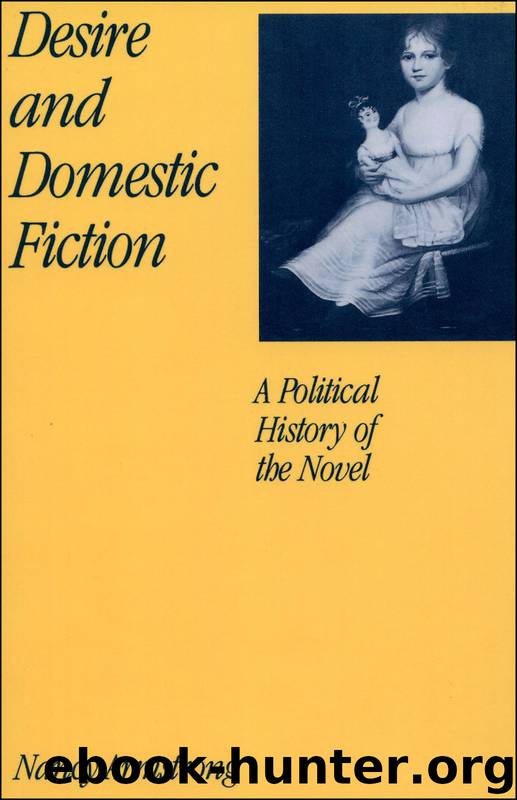Desire and Domestic Fiction by Armstrong Nancy;

Author:Armstrong, Nancy;
Language: eng
Format: epub
Publisher: Oxford University Press, Incorporated
Published: 1987-04-14T16:00:00+00:00
4
History in the House of Culture
For each new class which puts itself in the place of the one before it, is compelled, simply in order to achieve its aims, to represent its interest as the common interest of all members of society, i.e., employing an ideal formula to give its ideas the form of universally valid ones.
KARL MARX, The German Ideology
It is a great truth, that you cannot extinguish violence by violence. You may put it down for a time; but while you are crowing over your imaginary success, see if it does not return with seven devils worse than its former self!
ELIZABETH GASKELL, Mary Barton
Most literary historical accounts of domestic fiction endeavor to make a continuous narrative out of material that actually proceeds in fits and starts. This chapter will argue that the gaps in any such narrative are important. They tell us when this fiction could not deal with the important issues of the day, just as its reappearance in startlingly new forms suggests that it was engaging a particular moment in history. In other words, the sporadic production of domestic fiction implies that discontinuities were a function of fiction’s place in a much larger process of meaning. Such a history also implies that the work of organizing and interpreting reality continued in other symbolic modes when fictions of courtship and marriage did not serve this purpose particularly well. This chapter will show why the period of time intervening between Austen’s fiction and that of the Brontës was indeed a gap essential to understanding their respective places in history.1
In considering what happened to fiction during the years between 1818 and 1848, however, one encounters a problem, for the novel-reading public was preoccupied with an issue that appears to have had little to do with matters of courtship and kinship. Historians show that many people within the middle classes as well as most of those within the landowning and laboring classes were pouring their intellectual energy into a struggle to curtail industrial expansion.2 In the aftermath of the French Revolution, diverse groups of people blamed mechanization for practically every problem troubling England. Few, if any, could ignore the poverty, food shortages, bouts of inflation, crippling illiteracy, demographic dislocation, and unrest among the laboring poor. As the supposed cause for such social disruption, the machine became so unpopular that violence against it was tolerated, if not openly condoned. The assaults on machinery seemed to be for the good of the whole society, while mechanization appeared to serve only the interests of the ruthless few.
“By all the rules of intellectual warfare,” remarks Harold Perkin, “the aristocratic ideal should have won the battle for the mind. The aristocracy was the army in possession, defending a prepared position, and in control of the most powerful organs of opinion and most of the institutions of education.”3 Yet each attempt to resist mechanization ultimately strengthened the industrialists’ position. They won the intellectual war—a war to determine the definition of culture itself—as the literate public began regarding resistance to machinery as more dangerous than machinery itself.
Download
This site does not store any files on its server. We only index and link to content provided by other sites. Please contact the content providers to delete copyright contents if any and email us, we'll remove relevant links or contents immediately.
| African | Asian |
| Australian & Oceanian | Canadian |
| Caribbean & Latin American | European |
| Jewish | Middle Eastern |
| Russian | United States |
4 3 2 1: A Novel by Paul Auster(11764)
The handmaid's tale by Margaret Atwood(7424)
Giovanni's Room by James Baldwin(6783)
Asking the Right Questions: A Guide to Critical Thinking by M. Neil Browne & Stuart M. Keeley(5340)
Big Magic: Creative Living Beyond Fear by Elizabeth Gilbert(5330)
Ego Is the Enemy by Ryan Holiday(4924)
On Writing A Memoir of the Craft by Stephen King(4650)
The Body: A Guide for Occupants by Bill Bryson(4562)
Ken Follett - World without end by Ken Follett(4430)
Bluets by Maggie Nelson(4245)
Adulting by Kelly Williams Brown(4215)
Eat That Frog! by Brian Tracy(4134)
Guilty Pleasures by Laurell K Hamilton(4104)
White Noise - A Novel by Don DeLillo(3819)
The Poetry of Pablo Neruda by Pablo Neruda(3804)
Fingerprints of the Gods by Graham Hancock(3723)
Alive: The Story of the Andes Survivors by Piers Paul Read(3717)
The Book of Joy by Dalai Lama(3677)
The Bookshop by Penelope Fitzgerald(3609)
